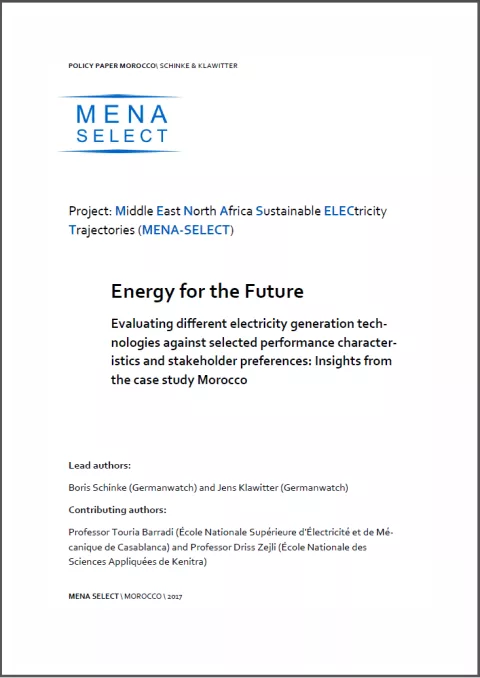
Since November 2015, Germanwatch has conducted several rounds of stakeholder workshops in Morocco as the first country case of the MENA-SELECT project. Field research in Morocco was finalized in May 2016. In this policy paper the approach and the results of the field research are presented.
Morocco’s future electricity consumption is projected to increase rapidly. This will require the deployment of additional electricity generation capacities with volumes four times higher by 2030 and more than ten times higher by 2050 compared to available capacities today. Hence, the major part of the country’s electricity infrastructure is still to be built and substantial investments in additional power generation capacities are yet to be made. Given that electricity systems are developed not in isolation from a country’s development challenges, but in continuous interaction with complex sociotechnical systems, this study sheds light on the interface between electricity generation technologies, sustainable development, and stakeholders’ preferences in Morocco. The results of a multi-criteria decision analysis and an assessment of the performance of 4 renewable and 4 conventional electricity generation technologies, i.e., fossil-fueled generation including nuclear, against 11 sustainability criteria and different societal preferences in electricity planning provide guidance on how to expand Morocco’s future electricity generation capacities in sustainable and socially robust ways.
Derived from a series of seven stakeholder workshops, the study’s findings indicate that all renewable energy technologies are significantly superior in their compatibility with sustainable development and better reflect the preferences of Moroccan stakeholders than their conventional alternatives. In order to avoid a lock-in of the power sector in unsustainable pathways and conflictual technology assets, the results of this study are crucial for designing Morocco’s electricity future sustainably and with great societal support.
About MENA-SELECT
In a participatory approach with local stakeholders and together with its partner institutes, BICC investigates the socio-economic impacts, risks and opportunities as well as the potential for conflict of different energy scenarios and power production technologies in Morocco, Egypt and Jordan.
The research project is funded by the German Federal Ministry for Economic Cooperation and Development (BMZ), and its objective is to inform national decision-makers and debate on pathways for sustainable energy policies. Project partners are University of Flensburg, Wuppertal Institute for Climate, Environment, Energy, Germanwatch, International Institute for Applied Systems Analysis (IIASA).



